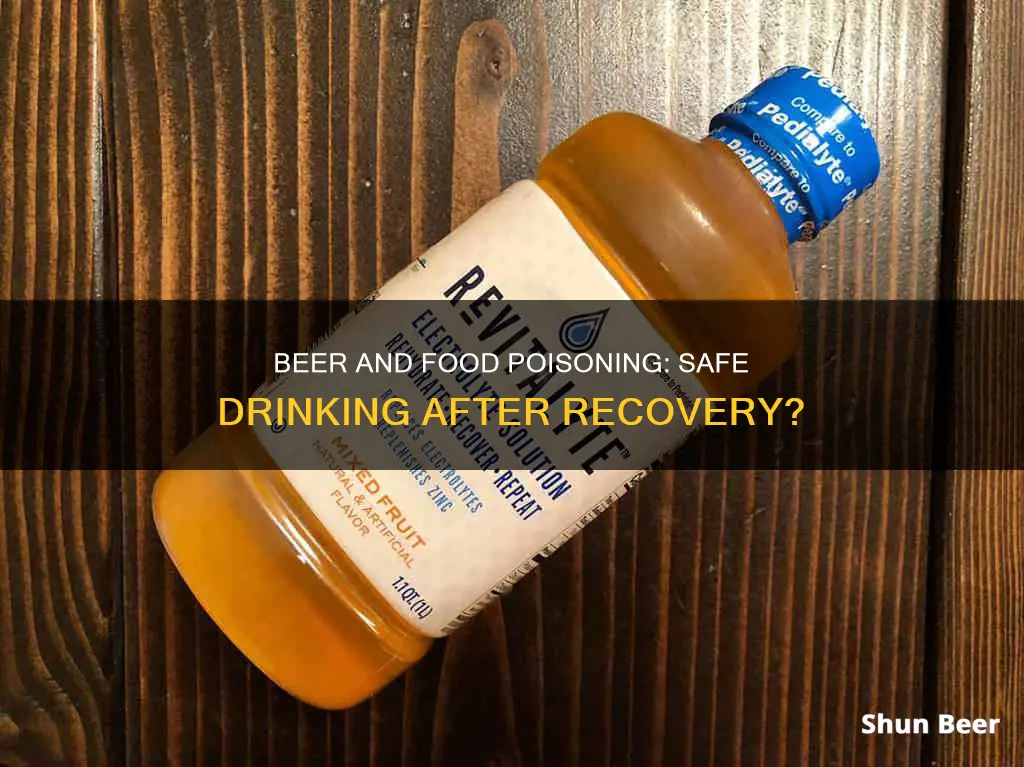
Food poisoning is relatively common, and symptoms can include vomiting, diarrhoea, and an upset stomach. While it usually lasts only a few hours to a few days, it can wreak havoc on your gut. After experiencing food poisoning, it's important to let your stomach settle and avoid food and drink for a few hours. Once you're feeling better, it's recommended to stick to bland, low-fat, and low-fibre foods that are gentle on your stomach and gastrointestinal tract. Caffeinated drinks and alcohol should be avoided as they can be dehydrating. However, some studies suggest that drinking alcohol with a meal can lower the risk of food poisoning or reduce its effects.
What You'll Learn

Alcohol may lower the risk of food poisoning
Drinking alcohol during a meal may lower the risk of food poisoning. Research over the years has confirmed that alcohol during meals can prevent food poisoning. For example, in 2002, health officials in Spain studied a salmonella outbreak among people exposed to contaminated potato salad and tuna at a banquet. They found that the sickness rate was lowest among those who had consumed large amounts of beer, wine, or spirits. Similarly, consumers of larger amounts of alcohol had the lowest levels of sickness documented in earlier studies of large salmonella outbreaks in Spain.
However, some studies suggest that the alcohol concentration in drinks may have to be relatively high for its protective effect to kick in. For instance, in a 1992 study, health officials in the United States examined an oyster-borne outbreak of hepatitis A and found that only drinks with an alcohol concentration of 10% or greater prevented or reduced the severity of sickness. The effect may be due to alcohol's ability to stimulate gastric acid secretions in the stomach, and wine may be particularly effective because grapes have antibacterial properties.
While alcohol may lower the risk of food poisoning, it is important to remember that it is not a substitute for proper food handling and preparation practices. The Centers for Disease Control and Prevention (CDC) estimates that 48 million people in the United States get sick from foodborne illnesses each year, with 128,000 hospitalizations and 3,000 deaths. Therefore, it is crucial to follow food safety guidelines, such as cooking food thoroughly, keeping food out of the "danger zone" temperature range, and washing hands properly, to prevent food poisoning.
Additionally, it is important to note that alcohol can irritate the stomach, especially when recovering from food poisoning. It is generally recommended to let the stomach rest and avoid food and drink for a few hours after experiencing food poisoning symptoms such as vomiting and diarrhea. Instead, focus on staying hydrated by consuming water, sports drinks, or ginger ale.
Pilsner Glasses: Best Beers to Enjoy in This Glassware
You may want to see also

Alcohol is not easy on the stomach
Alcohol can cause gas, bloating, and stomach pain, even if you don't have a digestive condition. It can also trigger acid reflux, as it causes the digestive system to produce more acid and relaxes the muscles that prevent digestive juices from travelling back up the oesophagus. In addition, alcohol can cause either diarrhoea or constipation, as it is a toxin that disrupts the digestive tract's normal routine.
Alcohol can also cause gastritis and ulcers. It damages the cells that protect the stomach lining from acid and digestive enzymes, promoting inflammation that can lead to heartburn, gastritis, and ulcers. Furthermore, because of how alcohol damages the lining of the small intestine, it can disrupt the balance of bacteria in the gut, triggering gastrointestinal symptoms such as gas and diarrhoea.
The effects of alcohol on the stomach can be particularly problematic for people with digestive disorders like irritable bowel syndrome, ulcerative colitis, or Crohn's disease. However, even those without diagnosed gastrointestinal conditions can experience tummy trouble after consuming alcohol.
The negative effects of alcohol on the stomach can be minimised by drinking in moderation, opting for lower-proof alcohols with less sugar, such as dry wines, light beers, vodka, and gin. It is also recommended to drink a glass of water with each alcoholic beverage, as alcohol has a diuretic effect and can lead to dehydration. Eating something an hour or so before drinking can also help, as having food in the stomach slows down alcohol digestion, minimising side effects and limiting damage to the stomach lining.
Beer at Work: Is It Legal?
You may want to see also

Alcohol can dehydrate you
Alcohol is a diuretic, which means it causes your body to remove fluids from your blood through your renal system (kidneys, ureters, and bladder) at a much quicker rate than other liquids. If you don't drink enough water with alcohol, dehydration can occur quickly.
Drinking alcohol on an empty stomach can contribute to dehydration. When you drink on an empty stomach, alcohol can be absorbed into the bloodstream within minutes. Drinking water or eating while consuming alcohol can slow this process.
Drinking alcohol can also suppress your appetite, making you less likely to eat while drinking. This can speed up alcohol absorption and increase the risk of dehydration.
To prevent dehydration when consuming alcohol, it is recommended to:
- Drink alcohol in moderation.
- Drink slowly and pace yourself.
- Consume water or other hydrating beverages along with alcohol.
- Eat hydrating foods and avoid fried and high-sodium foods.
It is important to note that while dehydration may not be the primary effect of alcohol consumption, it is still crucial to stay hydrated to support your organs, such as the liver and kidneys, which work overtime to process alcohol.
Beer Drinking in Oklahoma: Sunday's Special Rule
You may want to see also

Alcohol may kill food poisoning bacteria
Research over the years appears to confirm that alcohol with a meal can lower the risk of food poisoning. For example, in 2002, health officials in Spain studied an outbreak of salmonella among people exposed to contaminated potato salad and tuna at a large banquet. Their findings, published in the journal Epidemiology, showed that the rate of sickness was lowest in those who had consumed large amounts of beer, wine, or spirits. Consumers of larger amounts of alcohol also had the lowest levels of sickness documented in earlier studies of large salmonella outbreaks in Spain.
However, some studies suggest that a drink may need to be stiff for alcohol's protective effect to kick in. In a 1992 study, health officials in the United States examined an oyster-borne outbreak of hepatitis A and found that only drinks with an alcohol concentration of 10% or greater prevented or reduced the severity of sickness. The effect may be related to alcohol's ability to strongly stimulate gastric acid secretions in the stomach, and wine may be particularly effective because grapes have antibacterial properties.
While alcohol may have some protective effects against food poisoning bacteria, it is important to note that alcohol is not easy on the stomach and can make nausea worse. If you are recovering from food poisoning, it is generally recommended to let your stomach rest and avoid food and drink altogether for a few hours. Instead, focus on rehydration by taking small sips of water or sports drinks that contain electrolytes.
Beer and Doxycycline: Is It Safe to Mix?
You may want to see also

It's best to avoid alcohol after food poisoning
Drinking alcohol with a meal can lower the risk of food poisoning. However, it is best to avoid alcohol after food poisoning. Food poisoning typically lasts a few hours to a few days, and during this time, it is important to let your stomach rest and recover.
Alcohol is not easy on the stomach, and it could make the nausea much worse. It is important to remember that vomiting and diarrhea can cause dehydration, which is a serious concern during food poisoning. Alcohol is dehydrating, and it can make this issue worse. Therefore, it is best to avoid alcohol and focus on rehydrating with water or sports drinks that contain electrolytes.
In addition to dehydration, food poisoning can cause changes in gut bacteria. It is recommended to eat foods that promote gut healing, such as probiotics and bland, low-fiber foods. Alcohol does not fit into this category and could irritate your gut further.
Overall, it is best to avoid alcohol after food poisoning and prioritize rest, rehydration, and gentle, nutritious foods.
Beer and Aimovig: What You Need to Know
You may want to see also
Frequently asked questions
It is not recommended to drink beer or any other form of alcohol after food poisoning as alcohol can be tough on the stomach and make nausea worse. It is best to stick to water or clear soda/ginger ale.
It is important to focus on rehydration after food poisoning. Vomiting and diarrhea can cause dehydration, so start with small sips of water or sucking on ice chips. You can also drink sports drinks, non-caffeinated sodas, and chicken or vegetable broth.
It is recommended to stick to bland, low-fat, and low-fiber foods that are gentle on the stomach and gastrointestinal tract. Foods such as bananas, rice, applesauce, and toast (the BRAT diet) are easy to digest and can help with recovery. It is also beneficial to consume probiotics and prebiotics to restore healthy gut bacteria.
It is best to give your body time to recover fully from food poisoning before consuming alcohol again. There is no specific timeframe, as it depends on how long your symptoms last and how quickly your body rehydrates and tolerates solid foods. Listen to your body and gradually introduce foods and drinks back into your diet.







